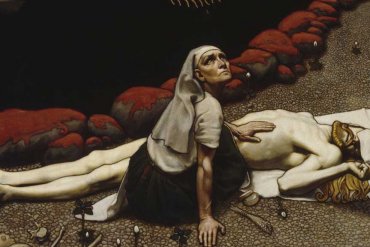It’s almost Walpurgisnacht, no better moment to have a closer look at our witches or Hexen. Where did this cruel hatred against women and the ancient pre-christian sanctuaries start? When Pope Innocent VIII (1484–92) professed his belief in witchcraft, he condemned it, and dispatched inquisitors to Germany to try its supposed practitioners and punish them unimpeded. Singling out Mainz, Cologne, Trier, Salzburg, and Bremen, the papal bull declared that “some parts of Northern Germany” were...
Hamingja, as used in the sagas, stands for an abstract conception, that of something belonging to an outstanding person which is partly a matter of character and partly of personality, and partly something more than either—that strange quality of ‘luck’ or luck-lessness’ which attaches itself to certain individuals more than others. It is something which can be handed on after death, and it usually remains within one family. It is usually connected with the name,...
Harvest festivals celebrated more than finished work for the season; they celebrated the capacity to survive the winter. The best known of these harvest festivals was the Eleusinian Mysteries, a weeklong celebration in ancient Greece that fell close to the Autumn Equinox. The equinox is not just a one-day event It can happen over a span of two to three days depending on the location. Since Fall Equinox traditions center on the work of the harvest, allowing a few days […]...
Heretic Middle English: from Old French heretique, via ecclesiastical Latin from Greek hairetikos ‘able to choose’ (in ecclesiastical Greek, ‘heretical’), from haireomai ‘choose’. In the Encyclopaedia Britannica one can read:“The word heresy is derived from the Greek hairesis which originally meant an act of choosing, and so came to signify a set of philosophical opinions or the school professing them. As so used the term was neutral, but once appropriated by Christianity it began to...
Hella, Hel, known to all Germanic peoples, including the Goths as Hellarunester. A Gothic word for “witch” was Haljoruna. The name itself stems from a root meaning “to hide”. The word Hellirunar describes people who ‘rune’ (Speak, sing, whisper) with Hel/Helja, the goddess and realm of the underworld. “Hell”, in its original meaning is the hidden realm, the dark and foggy place where the dead and unborn dwell. Often the term is used in a...
Meister Eckhart (the thirtheenth-century German mystic) once said, “if you fight your death, you’ll feel the demons tearing away your life, but, if you have the right attitude to death, you will be able to see that the devils are really angels setting your spirit free. In the ancient belief systems, the being who guides the human spirit through the underworld and helps negotiate the way past the guardian demons is the god of planet Mercury. In the Mystery schools […]...
Grimm writes that the Hörselberg of Thuringia was still considered in the 10th through 14th centuries to be the residence of the German goddess Holda and her host. He cited legends of night-women in the service of dame Holda. Those women rove through the air on appointed nights, mounted on beasts. He asserted that they were originally dæmonic elvish beings, who appeared in woman’s shape and did men kindnesses. Grimm asserted that the identity of...
llmarinen the Smith, was a young companion of the wizard and demi-god Väinämöinen. Väinämöinen was the god of chants, songs and poetry; in many stories Väinämöinen was the central figure at the birth of the world. llmarinen But llmarinen was a wizard in his own right. He loved the daughter of Louhi, Sorceress of the North. The maiden loved him, too, but Louhi made the wooing a rough one: She charged the young man to...
The attentive reader of the first episodes of Maier files will have noticed that the tale once told by Rolf Dietrich and the history of Otto Maier are filled with powerful themes and images that might provide a clue to the real hidden mystery, among them: the Rose Trail (Troj de Reses), web of woven silk, the knights in the line of Dietrich von Bern, the enchanted windmill, fiancée of the Month of May, the land beyond the North, Parzival […]...
There are circa 21,000 visions of Mary in the last 1,000 years, of which 210 were reported between 1928 and 1971. Remarkable fact is that even before Christianity visions and apparitions of Rose Ladies were seen. The most famous of last century (1917) was Fatima. According to Sister Lúcia (she was one of the children who saw the Virgin Mary), Mary requested the consecration of Russia to her Immaculate Heart on several occasions. Mother Goddesses...
In the rich tapestry of Old Norse literature, tales of encounters between Christian kings and the remnants of the old gods persist as fascinating narratives that reflect the complex interplay between the pagan past and the emerging Christian present. One such tale unfolds in the saga of Óláfs Saga Helga, captured vividly in the introductory quote. ‘Have you no desire to be like that king who was victorious against all whom he fought,who was handsome...
The date of the founding of the Odinic Mysteries is uncertain, some writers declaring that they were established in the first century before Christ; others, the first century after Christ. Robert Macoy, 33°, gives the following description of their origin: “It appears from the northern chronicles that in the first century of the Christian Era, Sigge, the chief of the Aser, an Asiatic tribe, emigrated from the Caspian sea and the Caucasus into northern Europe. He directed his course northwesterly from […]...













